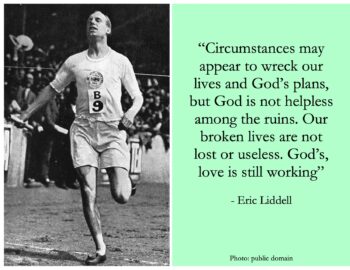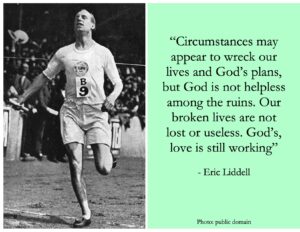
When I think of runner Eric Liddell, I envision young men running on the beach to beautiful instrumental music in the 1981 Oscar winning film Chariots of Fire. What made his story so powerful wasn’t his athletic prowess during the 1924 Olympics, though, it was what happened after the Games.
Eric Liddell was born in 1902 to a missionary family in Tientsin, Qing China. He and his elder brother, Rob, went to a boarding school for the sons of missionaries in south London. Later at Edinburgh University, Eric competed in rugby, cricket, and track, specializing in the 100-meter event. Known as The Flying Scotsman, he was humble about his talent. “God made me fast. And when I run, I feel His pleasure.”
In 1924, he was given the honor of running that event for the Scottish team at the Paris Olympics, but he refused to run his heats because they were scheduled on Sunday, a day he believed to be holy (Exodus 31:15: “For six days work is to be done, but the seventh day is a day of sabbath rest, holy to the LORD”). He also withdrew from the 4×100 meters and 4×400 meters relay teams, in which Great Britain stood a chance of success, because the finals were on a Sunday. Instead, coaches put him into the 400-meter race, which happened later during the week. And set a new world record with a time of 47.6 seconds and won the gold medal. He also won bronze in the 200-metre event. He had this to say about his one and only Olympics: “It has been a wonderful experience to compete in the Olympic Games and to bring home a gold medal. But since I have been a young lad, I have had my eyes on a different prize. You see, each one of us is in a greater race than any I have run in Paris, and this race ends when God gives out the medals.”
In 1925, he returned to Northern China to teach chemistry and coach track at a missionary school. War came to China eight years later when the Empire of Japan invaded. Eric’s pregnant wife and two daughters escaped to Canada, but he stayed, wishing to provide medical care to others with his brother, Rob, who was a doctor. In 1943, authorities detained him in a civilian internment camp at Wei Hsien, a seven-acre compound located 500 miles south of Peking. Living with him were 1800 prisoners from 11 allied nations—a mixed assembly of missionaries, businesspeople, government functionaries, and assorted other civilians, including prostitutes.
The overcrowded conditions were horrific. Inmates only received a piece of bread and a bowl of soup daily, and disease spread rapidly. Liddell became a leader and a light of hope in the camp, helping the elderly, teaching children, and organizing games. He had a marvelous sense of humor and was full of laughter and practical jokes. He volunteered for the unpleasant tasks that others shunned ― cleaning the latrines or making fuel by rolling balls of coal dust mixed with clay.
When he first began experiencing severe headaches and forgetfulness, one doctor suggested Eric was having a nervous breakdown. Sadly, it was much more than that. He died of a brain tumor on February 21st, 1945. His last word was “surrender.” Eric Henry Liddell, known affectionately as “Uncle Eric,” was only 43 years old.
